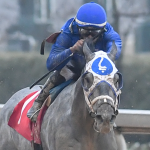
Preakness Quick Sheet: Get to Know the 2021 Preakness Horses

The first of Cigar’s 15 stakes wins came at 9-1 odds in the race that now bears his name, the Cigar Mile Handicap, which goes to show how pivotal the 1994 edition of Aqueduct’s NYRA Mile would be for the horse, his connections, and for Thoroughbred racing at large over the next two years.
The NYRA Mile had actually been canceled in 1993 due to purse cuts, but Cigar’s performance a year later helped cement its position on the New York racing calendar. The race was renamed in Cigar’s honor in 1997 after he retired with two Horse of the Year titles, a Breeders’ Cup Classic trophy, and the top spot, at the time, on the all-time leading earners list.
In hindsight, it would be easy to say that Cigar had provided fair warning in October 1994 when he rumbled to an eight-length win at the same track and distance, but that was an allowance race and the competition he faced in the NYRA Mile was top flight, with the likes of proven Grade 1 winners Devil His Due, Bertrando, Harlan, and Storm Tower.
Mike Smith piloted Cigar in the allowance prep but stuck with Devil His Due in the NYRA Mile, which opened the door for Jerry Bailey’s fateful association with Cigar. In the NYRA Mile, Cigar took control in the middle of the turn and drew off powerfully to win by seven lengths. Bailey would be on board for the rest of Cigar’s career: a rampage of 16 wins in 19 starts, including 11 Grade 1 victories, plus a fitting coronation in the inaugural Dubai World Cup, which was not yet a group stakes event.
Cigar’s trainer, Bill Mott, was not in attendance on raceday at Aqueduct — he was in Japan with Paradise Creek in what would turn out to be a passing of the torch, the finale for one star and the launchpad for another, within a few hours for Mott and owner-breeder Allen Paulson.
Paradise Creek, who would be honored as champion turf male of 1994, wrapped up his career with a gallant second-place finish by a nose in the Group 1 Japan Cup a few hours after Cigar made his statement in the NYRA Mile.
Long before live race video was widely available, especially on the other side of the world, Mott found out about Cigar’s performance in trickles: first, that the horse had won, and later, the manner in which he had done it.
“Back then, you had to call the racing office for the result and then we found out later just how easily he had done it,” Mott said. “It was certainly was not like today when you can just turn on your computer and watch from anywhere.
“It was exciting. We had a very good day, and if Paradise Creek had gotten up in the Japan Cup, man, that would have been a great day.”
With Mott in Japan, his assistant at the time, Simon Bray, saddled Cigar at Aqueduct. Bray said he still has a copy of the winner’s circle photo of him with Cigar and singer David Cassidy, who presented the winning trophy.
“We went in with some confidence with Cigar, even though it was a tough field,” Mott said. “He had won that allowance impressively and in good time, and it looked like he had made a major turnaround there [in switching back to dirt]. Of course, no one could know how big of a turning point it really was. I can’t pretend to be smart enough to know that he was going to win 16 in a row. It was gradual: he came down and won an allowance at Gulfstream and then beat Holy Bull in the Donn Handicap but probably did not get as much credit for it because Holy Bull broke down in the race. He came back and won the Gulfstream Park Handicap and then the real deal was when he won the Oaklawn Handicap that spring in a strong field.”
Cigar would pull off a clean sweep in 1995, winning all 10 of his starts, capped by the Breeders’ Cup score at Belmont Park that prompted Tom Durkin’s memorable narration: “Here he is, the unconquerable, invincible, unbeatable Cigar!” That ball started rolling at Aqueduct in the fall of 1994.